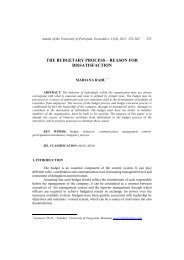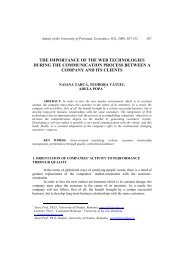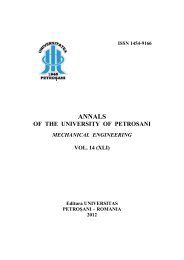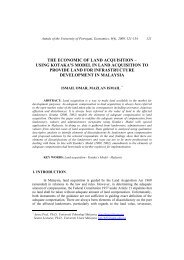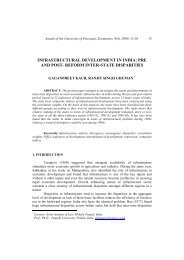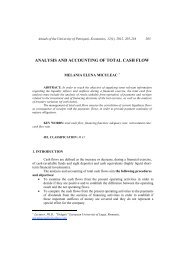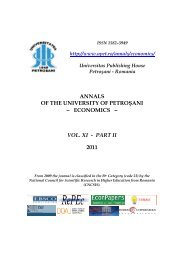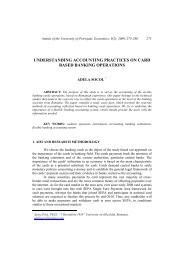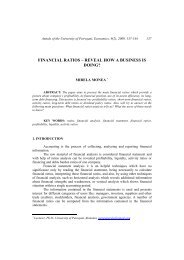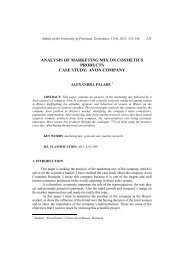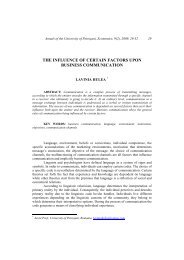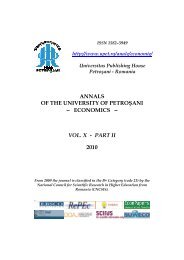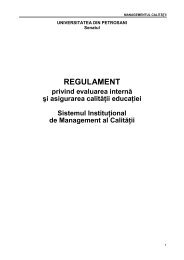annals of the university of petroÅani â¼ economics â¼ vol. xi - part i ...
annals of the university of petroÅani â¼ economics â¼ vol. xi - part i ...
annals of the university of petroÅani â¼ economics â¼ vol. xi - part i ...
Create successful ePaper yourself
Turn your PDF publications into a flip-book with our unique Google optimized e-Paper software.
262 Trandafir, A.; Brezeanu, P.; Stanciu A.P.<br />
In addition, tax competition may affect <strong>the</strong> composition (structure) <strong>of</strong> public<br />
goods provided. However, <strong>the</strong> issue <strong>of</strong> public expenditure structure was initially<br />
neglected. Keen and Marchand (Keen & Marchand, 1997, pp.33-53) addressed this<br />
issue and showed that, in <strong>the</strong> presence <strong>of</strong> mobile capital, tax competition tends to lead<br />
to an over-supply <strong>of</strong> resources and infrastructure to subfurnizare resources in those<br />
areas that directly affect consumer welfare such as social services.<br />
The classic work on fiscal federalism, it is certainly a loss <strong>of</strong> wealth resulting<br />
from tax competition. Therefore, coordination both in terms <strong>of</strong> tax rates and in terms <strong>of</strong><br />
public expenditure is a strong argument in <strong>the</strong> presence <strong>of</strong> competition for mobile<br />
factors. However, decentralization, especially in <strong>the</strong> first half <strong>of</strong> <strong>the</strong> '90s, was actively<br />
promoted as a necessary policy choice for many transition economies in Central and<br />
Eastern Europe and characterized as a means <strong>of</strong> getting rid <strong>of</strong> excessive centralization<br />
and politicization <strong>of</strong> economic life. While international political debate turned to <strong>the</strong><br />
institutional requirements for successful decentralization, <strong>the</strong> debate on <strong>the</strong> potential<br />
benefits <strong>of</strong> decentralization is far from complete.<br />
Romania is one <strong>of</strong> those countries to promote decentralization to depoliticize<br />
economic life in its transition to a market economy. This article analyzes <strong>the</strong> structure<br />
<strong>of</strong> public services provided in Romania under <strong>the</strong> impact <strong>of</strong> tax competition, <strong>the</strong> race to<br />
<strong>the</strong> bottom affecting all economies under globalization impact. Model analysis is based<br />
on <strong>the</strong> Keen-Marchand model, providing different public services in <strong>the</strong> presence <strong>of</strong><br />
tax competition and uses empirical data from <strong>the</strong> consolidated budget <strong>of</strong> Romania<br />
during 1995-2010.<br />
2. PROVIDING PUBLIC SERVICES IN ROMANIA AMID TAX<br />
COMPETITION<br />
Starting from <strong>the</strong> idea <strong>of</strong> Keen-Marchand (Keen & Marchand, 1997, pp.33-53)<br />
by providing different public services in <strong>the</strong> presence <strong>of</strong> tax competition, we fur<strong>the</strong>r<br />
examined this issue for Romania during 1995-2010, showing <strong>the</strong> impact <strong>of</strong> such<br />
competition on our country. In <strong>the</strong> analysis we used <strong>the</strong> following variables:<br />
- Realized tax revenues (<strong>the</strong>ir share in GDP), as an independent variable. By this<br />
we caught <strong>the</strong> effect <strong>of</strong> tax rate reduction (<strong>the</strong> so-called "race-to-<strong>the</strong>-bottom",<br />
in which Romania joined in <strong>the</strong> current tax competition and globalization);<br />
- Different categories <strong>of</strong> expenditure incurred (share in GDP), as dependent<br />
variables. By that, we surprised <strong>the</strong> public services provided and <strong>the</strong>ir structure<br />
in <strong>the</strong> presence <strong>of</strong> <strong>the</strong> race to <strong>the</strong> bottom in conditions <strong>of</strong> globalization.<br />
In <strong>the</strong> analysis we used a linear regression model, as follows:<br />
where:<br />
( x)<br />
y = f<br />
(1)<br />
( x) α + βx<br />
f = (2)<br />
where:<br />
y - dependent variable, represented in this case, <strong>the</strong> share <strong>of</strong> public expenditure in GDP<br />
has made various, such as: general public services (denoted GSP), defence and national<br />
security policy (noted AOSN), education (denoted INV), health (denoted Ch_S),



